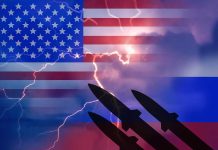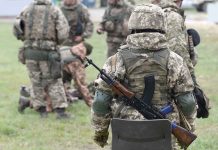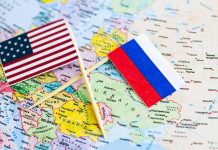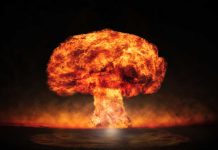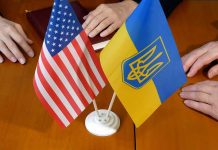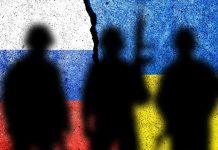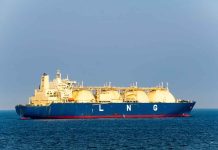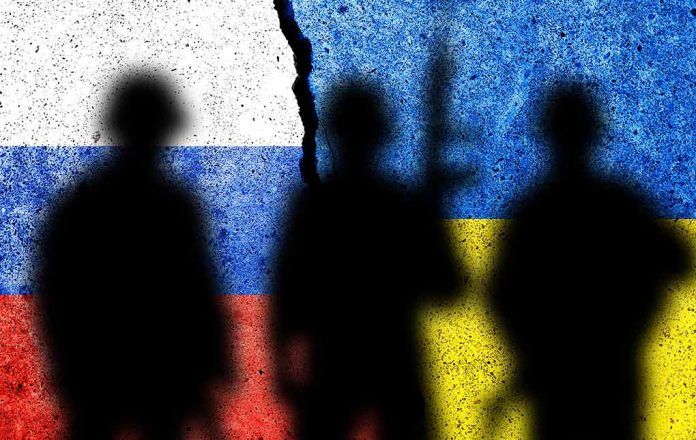
Ukrainian forces engage in first clash with North Korean troops along the Russian border, marking a significant escalation in the ongoing conflict.
At a Glance
- Approximately 10,000 North Korean troops are believed to be in Russia, with some deployed to the Kursk region
- Ukrainian soldiers engaged in combat with North Korean troops along the Russian border on Monday
- NATO Secretary-General Mark Rutte confirms North Korean troop deployment, calling it a “significant escalation”
- Concerns raised about potential transfer of nuclear or ballistic missile technology to North Korea
- The situation highlights shifting alliances and heightened geopolitical tensions
North Korean Troops Enter the Fray
Ukrainian forces have reportedly clashed with North Korean troops along the Russian border, marking a new and concerning development in the ongoing conflict. According to Ukrainian intelligence and corroborated by South Korea’s National Intelligence Service, approximately 10,000 North Korean soldiers are believed to be in Russia, with some heading to the Kursk region to support Russian military operations.
This deployment signifies a substantial shift in the dynamics of the Russia-Ukraine war, with far-reaching geopolitical implications. The presence of North Korean troops on Russian soil is considered a violation of multiple UN Security Council resolutions, further complicating the international response to the conflict.
Ukraine attacked North Korean troops for the first time since they were deployed in the Russian border region where Kyiv’s forces have been holding territory since August, according to an official https://t.co/p2htyVwCtO
— Bloomberg (@business) November 4, 2024
Strategic Implications and International Reactions
The introduction of North Korean forces into the conflict zone has sparked widespread concern among Western allies and international organizations. NATO Secretary-General Mark Rutte has described this move as a “significant escalation” and a “dangerous expansion” of the conflict, highlighting the gravity of the situation. Rutte also stated that the deployment of North Korean troops to Russia was a sign of Russian President Vladimir Putin’s “growing desperation.”
The North Korean presence highlights a new phase in the Russia-Ukraine conflict, showing a complex alignment of alliances and enhancing geopolitical stakes. NATO is actively consulting with its members, Ukraine, and Indo-Pacific partners regarding these developments. There are growing concerns that Russia intends to use these North Korean soldiers in combat or support operations near Ukraine’s border, potentially increasing pressure on Ukraine’s military and heightening geopolitical tensions in the Korean Peninsula and Indo-Pacific region.
Motivations and Risks
Russia’s decision to accept North Korean military support is speculated to be driven by a need to alleviate conscription pressures and acquire additional military supplies. For North Korea, this cooperation may offer economic benefits, military-technical assistance, and valuable combat experience for its troops. Regardless of motivation, this arrangement is a new phase in the deepening Russian-North Korean alliance.
The effectiveness of North Korean troops remains uncertain due to potential integration challenges with Russian forces. Additionally, North Korea faces risks of potential desertions and defections of its soldiers. The international community has expressed deep concern about the possibility of nuclear or ballistic missile technology transfers to North Korea, which could jeopardize global non-proliferation efforts and threaten peace and stability on the Korean Peninsula and beyond.
Global Repercussions
The involvement of North Korean troops in the Russia-Ukraine conflict has far-reaching implications for global security and international relations. It suggests a growing “axis of upheaval” involving China, Russia, North Korea, and Iran, potentially encouraging other states to strengthen military ties with Russia. This development has prompted increased cooperation between South Korea, Japan, the United States, and NATO in response to North Korean actions.
As the situation continues to evolve, the international community remains on high alert, closely monitoring the developments and their potential impact on regional stability and global security. The clash between Ukrainian forces and North Korean troops marks a critical juncture in the ongoing conflict, with the potential to reshape alliances and strategic calculations across multiple regions.


